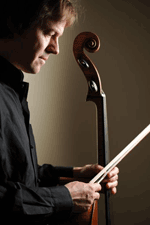> [Archived] Interviews

Interview with cellist Jan Vogler
Jan Vogler was the one who had the idea of setting up the Moritzburg Chamber Music Festival 18 years ago. Currently he is carrying a strong solo career in the United States and his native Germany; he is in charge of the Moritzburg Festival, but also of the Dresden Festival.
The Moritzburg Festival was created my musicians in order for them to play chamber music during the summer holiday and the public was not that important in the beginning. I was at the Marlboro Festival and I lived this astonishing experience there, which they wanted me to bring here: a summer holiday in the midst of nature, with music and wonderful friends. This was the idea in the beginning and we did not realize back then that the festival would evolve this much. But 18 years later, the spirit remains the same: very good performers come here, study together, and it must be said that none of the pieces which you can hear at Moritzburg have ever been performed by any interpreter before their coming to study in Moritzburg.
It is some sort of musical holiday…
Yes, but for me it actually means working even more than at the Dresden Festival, and I play here a lot - I have 10 concerts with three new pieces each, so it is important work, but I do it with joy.
Every year you choose new artists to come to Moritzburg.
Yes, there are at least 50% new interpreters each year; this is one of the principles. We do not want it to be a hundred percent family atmosphere, I want there to also be curiosity: who is this new person who is coming to Paris, how will he play? We, of course, know their names and reputations, but we do not know their musical ideas, and that is the beauty of the Moritzburg Festival.
Is the fact that there are many musicians of Asian origin a coincidence?
Yes, but the truth is that more and more Asian musicians are entering the scene of the world's top performers. I do not even take into consideration the nationality of any artist, I only see them and invite them. But it is fascinating that Asia is catching up so quickly, especially China.
Is there a secret to Chinese music?
I have a very controversial opinion regarding this topic. I have recently been to China and the fact is that 10 million children study piano and 4 million study the violin there, but very few of these talents go further because a formed system which can offer them the proper education does not yet exist. What we see are just the peaks of a generation, selected from millions of performers.
What will be the role of Europeans and Americans when Asia truly becomes a force?
I believe that the role of Europe will be, and I say this without any arrogance, to drive Asian artists towards the meaning of the European culture, because there is the need for an introduction. We do not have to teach them anything. It would more likely refer to their coming to see our museums, our cities, our culture, our literature, because in Europe there still is more musical tradition than in the East. Which does not necessarily mean that the forbidden city is actually older than the European culture; but this does not have anything to do with history, it has to do with something else: the classical music of the 18th, 19th and 20th centuries, produced almost entirely in Europe. So we can be friends with these Asian talents, which I actually am - it is not the case of the musicians invited to Moritzburg who are already world-class soloists, but I would very much like to bring Chinese students to Moritzburg, to show them the surroundings, the museums, the art, the country life."
Translated by Dana-Mihaela Toma and Elena Daniela Radu
MA Students, MTTLC, Bucharest University














